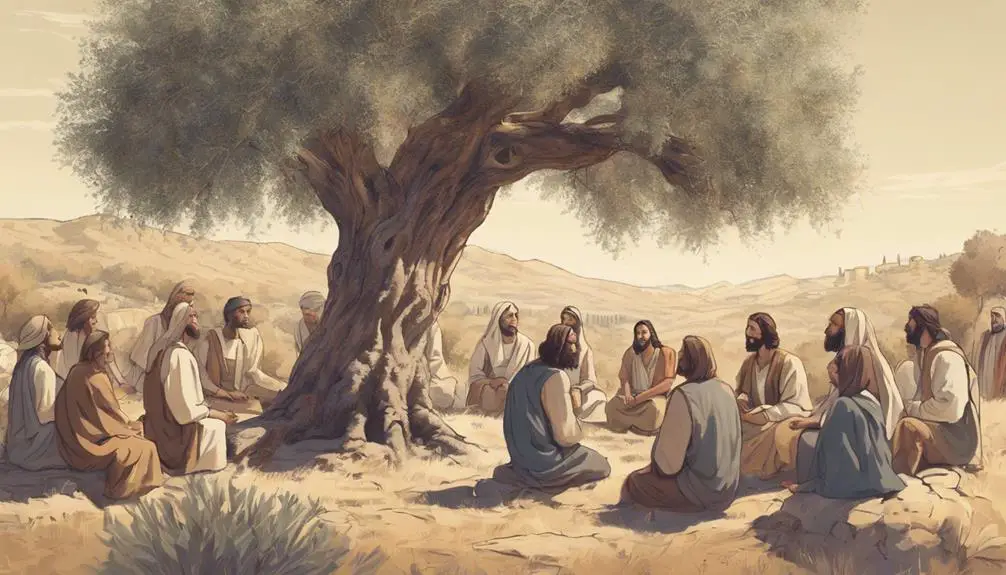Plunge into the depths of biblical forbearance, exploring its divine roots and transformative power for believers, and uncover why it's more than patience.

What Is Forbearance in the Bible
You might not be aware, but the concept of forbearance in the Bible encompasses much more than just patience—it's a multifaceted virtue that's deeply embedded in both God's character and His expectations of us.
It involves restraint, tolerance, and a willingness to bear with others' shortcomings, reflecting a profound aspect of divine love. As we unpack this concept, you'll discover its significance not only in God's actions but also in Jesus' teachings and its application among believers.
The exploration of how to practice forbearance today offers a compelling reason for you to further understand this transformative quality.
Key Takeaways
- Forbearance is a biblical virtue emphasizing patience, mercy, and tolerance rooted in God's character and Jesus' teachings.
- It promotes community cohesion by encouraging forgiveness and understanding among individuals.
- Biblical forbearance challenges believers to practice unconditional love and perpetual mercy, mirroring divine patience.
- Cultivating forbearance is essential for navigating contemporary social conflicts and fostering positive, impactful interactions.
Definition of Biblical Forbearance

In exploring the concept of forbearance within the biblical context, it's essential to understand that it embodies patience, restraint, and tolerance, as advocated throughout Scripture. This principle, deeply rooted in the teachings and narratives of the Bible, has origins that intertwine with the cultural and historical fabric of ancient societies. Analyzing the forbearance origins reveals its significance not just as a moral virtue but as a fundamental aspect of maintaining harmony and understanding within communities.
The cultural influences on the development of biblical forbearance are profound. In ancient times, societies were closely knit, and personal interactions often determined the welfare of the community. Forbearance, therefore, emerged as a vital virtue, encouraging individuals to overlook faults, extend grace, and practice patience. This ethos was crucial in fostering cohesion and ensuring the survival of communities in the face of adversity.
Moreover, the concept of forbearance in the Bible isn't presented in isolation. It's intricately linked with other virtues such as love, kindness, and mercy, highlighting a comprehensive approach to interpersonal relationships and community living. This amalgamation of virtues, influenced by the cultural contexts of the times, underscores the Bible's advocacy for a life led by compassion and understanding.
Understanding forbearance through this lens provides a richer appreciation of its place within biblical teachings. It's not merely about individual patience but about cultivating a society that values and practices tolerance and restraint, guided by love. The origins and cultural influences of biblical forbearance thus offer insightful perspectives into its enduring relevance and application in contemporary life.
Forbearance in God's Character

Understanding the concept of forbearance through its cultural and historical origins lays the groundwork for exploring its profound embodiment in God's character, as depicted in the Bible. The scriptural narrative paints a vivid picture of divine patience and merciful restraint, core aspects that define God's interactions with humanity. This portrayal isn't merely for admiration but serves as a template for human conduct, encouraging a reflection of these divine attributes in our daily lives.
The Old Testament is replete with instances where God's forbearance is evident. You see it in His dealings with the Israelites; despite their recurrent disobedience and lapses in faith, God exercises merciful restraint. This isn't indicative of weakness or indifference but underscores a deliberate choice to give His people the opportunity to return to righteousness. It's a testament to the depth of God's love and patience.
In the broader biblical context, divine patience manifests as a willingness to postpone deserved judgment, allowing time for repentance and spiritual growth. This aspect of God's character challenges the notion of an impulsive deity, instead revealing a being whose essence is love, willing to endure human frailty.
Moreover, God's forbearance isn't limitless; it's a strategic aspect of His divine governance, aiming to lead souls towards salvation. This delicate balance between justice and mercy, wrath and restraint, highlights the complexity of divine love. It invites you to ponder the depth of God's patience and its implications for your spiritual journey, encouraging you to mirror this divine attribute in your interactions with others.
Jesus' Teachings on Forbearance

Jesus' teachings provide a profound exploration of forbearance, illuminating its significance in fostering compassion and understanding among individuals. Through His parables and sermons, Jesus emphasized the importance of forgiving enemies and exhibiting unconditional love, even in the face of adversity. Such principles aren't merely lofty ideals but are presented as actionable directives for leading a life in alignment with divine will.
Analyzing Jesus' sermon on the mount, you encounter the directive to 'love your enemies and pray for those who persecute you' (Matthew 5:44). This command challenges the conventional wisdom of retribution, promoting a radical form of forbearance that transcends human instincts for vengeance. Jesus' approach to forbearance isn't passive; it's an active pursuit of peace and reconciliation, grounded in the power of unconditional love.
Moreover, the parable of the unmerciful servant (Matthew 18:21-35) offers a narrative exploration of forbearance. Here, Jesus illustrates the hypocrisy of failing to extend the same forgiveness one has received, underscoring the expectation of a perpetual cycle of mercy among individuals. This parable contextualizes forbearance not as an optional virtue but as a fundamental expectation for those who've experienced divine mercy.
In essence, Jesus' teachings on forbearance challenge you to embody compassion and mercy in your interactions. By forgiving enemies and demonstrating unconditional love, you reflect divine qualities, fostering a community rooted in understanding and mutual respect. Jesus' model of forbearance, therefore, isn't just a personal ethic; it's a blueprint for transforming societal relations through the power of empathetic engagement and love.
Forbearance Among Believers

Exploring the concept of forbearance among believers reveals its pivotal role in cultivating a cohesive and supportive faith community. Forbearance, in this context, isn't merely about tolerating one another's shortcomings; it's deeply rooted in the practice of community patience and interpersonal forgiveness. This principle is central to developing a nurturing environment where faith can flourish, underscoring the importance of patience and forgiveness in fostering unity among believers.
Analyzing scriptural directives, it's evident that forbearance isn't an optional virtue but a fundamental expectation for those within the faith community. The call for believers to bear with one another in love is a recurring theme, suggesting that the health and vitality of the community depend significantly on this practice. It's through this lens of mutual understanding and forgiveness that the fabric of the faith community is strengthened.
Interpersonal forgiveness, as advocated in biblical texts, isn't merely an act of letting go of grievances but is positioned as a transformative practice that rebuilds relationships and promotes healing. This aspect of forbearance challenges believers to look beyond the surface of interpersonal conflicts, recognizing the potential for growth and unity that comes from navigating these challenges together.
Moreover, community patience is highlighted as a virtue that sustains relationships during times of conflict or misunderstanding. It's this patience that allows space for dialogue, reflection, and ultimately, reconciliation. Such patience isn't passive; it's an active engagement in the work of maintaining community coherence and embracing the diversity within the faith community.
Practicing Forbearance Today

In today's fast-paced society, practicing forbearance has become more crucial than ever, serving as a foundational element for maintaining meaningful relationships and community cohesion. The advent of social media and the rise in community conflicts have only amplified the need for this virtue. You're constantly bombarded with opinions and actions that might not align with yours, making the practice of patience, restraint, and tolerance not just virtuous but necessary.
Aspect |
Challenge |
Forbearance Application |
|---|---|---|
Social Media |
Rapid spread of misinformation and negative interactions. |
Pause before responding to provocations; promote positivity. |
Community Conflicts |
Diverging opinions leading to discord. |
Seek to understand differing viewpoints; foster dialogue. |
Personal Relationships |
Miscommunications and differing expectations. |
Show patience; communicate openly and with empathy. |
This table encapsulates the essence of practicing forbearance in contemporary contexts, highlighting specific challenges and how forbearance can be applied effectively. In social media, the immediacy and anonymity can often lead to hasty, regrettable interactions. Here, forbearance teaches you to pause and consider the impact of your words before hitting 'send'. During community conflicts, it's easy to become entrenched in your viewpoint. However, applying forbearance involves actively seeking to understand the other side, which can lead to more constructive and less divisive outcomes. Lastly, in personal relationships, misunderstandings are inevitable. Forbearance becomes the bridge that fosters communication and understanding, allowing these relationships to deepen and thrive despite challenges.
Frequently Asked Questions
How Does the Concept of Biblical Forbearance Differ From Modern Legal or Financial Definitions of Forbearance?
You're looking at how forbearance differs in its usage, particularly between biblical contexts and modern legal or financial settings.
In legal terminology, forbearance refers to a creditor's agreement to delay enforcing a debt. Financial mechanisms employ it as a temporary relief option for borrowers.
However, biblically, forbearance embodies patience and restraint towards others, showcasing a moral and ethical dimension that extends beyond the transactional nature seen in legal and financial interpretations.
Are There Any Historical Events or Figures Outside of Biblical Narratives That Exemplify Biblical Forbearance?
Yes, historical events and figures outside biblical narratives embody biblical forbearance through philosophical patience and cultural endurance.
Figures like Gandhi and Mandela showed forbearance in their peaceful resistance against oppression, mirroring the patience and endurance advocated in biblical teachings.
Similarly, events like the American Civil Rights Movement, led by Martin Luther King Jr., highlight cultural endurance in the face of injustice, showcasing how philosophical patience can lead to transformative societal changes.
How Have Different Christian Denominations Interpreted the Concept of Forbearance in Varied or Similar Ways?
You'll find that different Christian denominations have nuanced views on forbearance, influenced by denominational teachings and cultural interpretations. These perspectives often reflect a blend of theological emphasis and historical context.
While some groups might stress patience and tolerance, others could highlight forgiveness and restraint. Analyzing these varied interpretations helps you understand the broader Christian ethos on forbearance, showing how deeply cultural and theological factors shape religious practice and belief.
In What Ways Can Biblical Forbearance Be Applied in Resolving Contemporary Global Conflicts?
Imagine you're mediating peace negotiations between two conflicting nations. Applying biblical forbearance could transform these talks. It's about patience, restraint, and empathy—key ingredients for conflict resolution.
By prioritizing understanding over immediate victory, you encourage both sides to find common ground. This approach isn't just theoretical; it's a practical tool for fostering dialogue and reconciliation.
It's a reminder that, even in global conflicts, patience and empathy can lead to lasting peace.
How Do Non-Christian Religions or Belief Systems View or Practice a Concept Similar to Biblical Forbearance?
In exploring concepts akin to forbearance, you'll find Islamic patience and Buddhist tolerance as key counterparts.
Islamic patience, or Sabr, emphasizes endurance and self-restraint in the face of adversity, mirroring the resilience taught in biblical forbearance.
Similarly, Buddhist tolerance isn't just about enduring; it's deeply rooted in understanding and compassion for all beings, encouraging a peaceful coexistence.
Both principles offer profound insights into managing conflicts, advocating for peace through understanding and self-discipline.
Conclusion
In essence, you've journeyed through the profound landscape of biblical forbearance, unraveling its essence in God's character, Jesus' teachings, and its vital role among believers. This exploration underscores forbearance not merely as a virtue but as a divine mandate, beckoning you to weave it into the fabric of daily interactions.
As you tread this path, remember, practicing forbearance today is akin to sowing seeds of peace and understanding, reaping a harvest of unity and love tomorrow. Embrace this challenge; the world yearns for such light.



Sign up